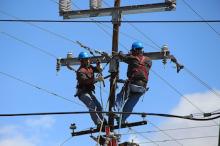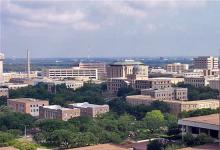Small Town Does Fiber Bigger In Texas - Community Broadband Bits Podcast 326

We don’t often get the opportunity to interview people from Texas, so when we heard about Mont Belvieu’s gigabit fiber optic network we knew we had to have them on the show. When we learned that four officials from the east Texas town would join us we said, “Even better!” City Manager Nathan Watkins, Director of Broadband and IT Dwight Thomas, Assistant City Manager Scott Swigert, and Communications and Marketing Director Brian Ligon are on the show this week to talk about their publicly owned network, MB Link.
Before they were able to provide the fast, affordable, reliable service to residents all over town, Mont Belvieu had to assert themselves in a legal proceeding against the State of Texas. In this conversation, the guys discuss their elegant argument that won over the court. You’ll also hear why community leaders decided that, even though Mont Belvieu had a thriving oil and gas industry, they felt that investing in high-quality Internet access for residents was a goal they aimed to achieve for the public good. The residents in Mont Belvieu drove this project.
People in Mont Belvieu have clambered to sign up for the network. Our guests discuss how they’ve used their town’s strengths to market the services they offer and how they continue to use communications to help subscribers get the most from MB Link. The guys also talk about how the city plans to add businesses to the network and the reactions from incumbents.
Read more about the network and the court action in our coverage about Mont Belvieu.
This show is 27 minutes long and can be played on this page or via Apple Podcasts or the tool of your choice using this feed.
Transcript below.
We want your feedback and suggestions for the show-please e-mail us or leave a comment below.
Listen to other episodes here or view all episodes in our index. See other podcasts from the Institute for Local Self-Reliance here.
Thanks to Arne Huseby for the music. The song is Warm Duck Shuffle and is licensed under a Creative Commons Attribution (3.0) license.










